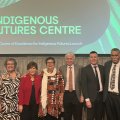UQ climbs to number two in new NHMRC project grants
The University of Queensland has consolidated its position as one of the nation's leading research universities by attracting the second highest number of new grant allocations nationally for 1999 from the National Health and Medical Research Council (NHMRC).
The University of Queensland was awarded 45 competitive new grant allocations worth $3.85 million, from a national total of 436 grants valued at $35.259 million.
The University has improved its ranking by one position nationally on 1998 and 1997 new project grant figures. For those two years the University has received the third highest allocation of new NHMRC grants.
In Queensland, the University attracted 85 percent of the $4.55 million of NHMRC funding to the State, receiving both the highest number and value of new project grants.
University of Queensland Deputy Vice-Chancellor (Research) Professor Paul Greenfield said it was particularly satisfying that the University had improved its performance in new project grants in a tougher and more competitive funding climate.
Professor Greenfield said the result reflected the diversity and quality of work by University medical and biological science researchers.
In NHMRC new and continuing project grants, the University of Queensland received total support of $10.729 million for 128 grants. Nationally, the NHMRC awarded 1269 new and continuing project grants valued at $102.711 million.
In Queensland, the University received the highest number of new and continuing NHMRC grants, attracting 86.7 percent of the $12.369 million allocated to the State.
The total pool of new NHMRC project grant funds available increased from $33.1 million for 412 grants awarded nationally in 1998 to $35.26 million for 436 new project grants in 1999.
University of Queensland projects to receive funding include an NHMRC fellowship to Dr Janet Keast (Physiology and Pharmacology Department) for a five-year, $944,081 investigation into how sex hormones keep the nervous system healthy. The study will focus on the sex steroid, testosterone.
The project will aim to understand how testosterone influences a group of neurons that control the reproductive organs and lower urinary tract in males. The experiments will study the changes in the electrical activity of nerve cells after they have been deprived of testosterone, and identify which types of nerve cells are particularly sensitive to the hormone. The results will have major implications for men's health and contribute significantly to our understanding of how testosterone works.
Professor Barry Nurcombe (Psychiatry Department) has been awarded $305,985 over three years to help find better ways of treating children who have suffered sexual abuse.
The treatment program proposed by Professor Nurcombe and his research colleagues aims to help survivors of sexual abuse by improving their attitude towards themselves and others, by encouraging health coping strategies and by providing consistent support to their parents. The children will be taught how to regulate their emotions, without denying or suppressing their experiences of abuse.
Head of the Anthropology and Sociology Department Professor Jake Najman earned a record number of four NHMRC grants, for projects (with co-researchers) ranging from the first major study of Australian sexuality, to palliative care for people with terminal cancer, pain relief, and end-of-life decisions.
The top four new grant recipients nationally in 1999 are:
(Total value and number of grants for 1999 are also included)
1. University of Melbourne $5.112 million, 56 grants - ($17.404 million, for 186 grants)
2. University of Queensland $3.849 million, 45 grants ( $10,730 million, for 128 grants)
3. University of Sydney $3.781 million, 44 grants ($10.728 million for 138 grants
4. University of Western Australia $3.186million, 37 grants.( $9.225 million for 98 grants)
For further information, contact Professor Greenfield, telephone 07 3365 3917 or the University Director of Research Services Jan Massey (telephone 3365 3640).



